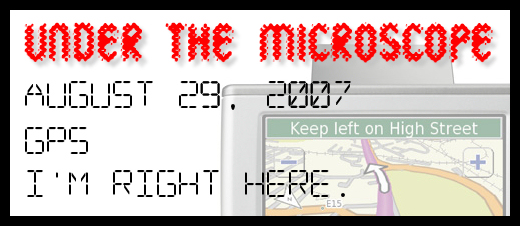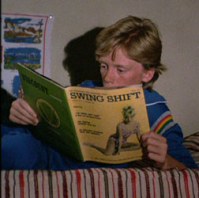 Like most philosophers, it is my policy to discuss all innovations and political talking points in the context of National Lampoon’s Vacation. The more we start to reinforce the idea that, like it or not, Chevy Chase is the button pusher in our creative subconscious, the sooner we will come out with good television shows and not utter crap like The Chevy Chase Show. Vacation is extra important, though, because its humor played out in a script that eerily mirrored everyday life, assuming you thought about your life over a large bottle of Granddad and hadn’t slept since the 2004 All-Star game. Some undoubtedly were won over by the subtle masturbation jokes, while others surely fell in love with Clark Griswold for the same sort of side-splitting dog murder that made Michael Vick an almost-as-endearing figure. Personally, my favorite scene is when Clark offers Russ his first beer and the youthful Griswold slams it with the kind of gusto that the nation’s fraternities have long been seeking in their prospective pledges. The point is that we got this little cinematic gem because Clark got lost and didn’t ask for directions, a Hollywood storyline that has only been employed a half-dozen thousand other times. Since 1994. This movie would have been a lot shorter – and less enjoyable – had the Griswolds possessed more effective means of navigation. Did somebody say GPS? Probably not, but anyway… GPS, or Global Positioning System as long-winded people call it, is a hot craze in the nation. The ability to have precise, point-to-point navigation available at their fingertips has left drivers with a sense of security never seen before. In fact, excluding New Jersey, the gross number of GPS units in vehicles on the highway at any given time outnumbers the gross number of dead bodies in vehicles for the first time in our nation’s history, a stat which should be good news to everyone but the Gambino crime family. Add to these figures the reality that golfers, anglers, farmers, and bored people using Google Earth are all among major groups rigorously employing GPS technology and you have something that’s more than a passing fad. It didn’t always look this promising, at least not to the general public. Of course the military and the Soviets had been frolicking on this playground since at the very least the early 80’s, but I’m not Oliver North and you’re not Valentina Tereshkova so this was a foreign concept to the rest of us until a lot later. I remember being introduced to the Global Positioning System in a handheld form in the seventh grade in the classic North Dakota class of AgriScience. It was apparently decided in the curriculum meeting the year before that our studies in casing our own sausages would be greatly enhanced with the ability to locate the finished frankfurters' nearest meridian. While this all sounds quite educational in theory, there were some problems with this otherwise sound reasoning. First, with such new technology, I am of the opinion that our teacher was simply reading out of the instruction manual and trying to teach from that, rather than his own acquired knowledge. And I’m not an expert in this (yet,) but the fact that he was usually holding the instruction manual during the lessons is decent evidence that this was so. I can’t blame him for being a novice in the technology, but it certainly made the learning curve that much steeper. The second, and far more important drawback to this unit of study was that in the mid-1990’s, consumer GPS systems were still heavily jammed. That is to say, unless you were the aforementioned North or Tereshkova, the “within inches” precision that we enjoy with GPS today was only a dream. The GPS was still quite helpful back then, I suppose, assuming that you weren’t too picky with where your destination was. The jamming technology was pretty powerful and the results weren’t too accurate, but we were still being pushed to embrace this suspect little box. And I suppose I would’ve used it in my car had I been okay with entering my ending destination as “somewhere in the vicinity of Minneapolis and Pittsburgh,” but the fact is that I wasn’t, so forgive my late adopter stance. The system's jamming mechanism was finally removed not too long thereafter and that’s when things took off. No longer did drivers have to accept routes that ended up near the Steel City – near being “Jacksonville.” No longer did golfers have to put up with the unconscionable situation of a 155 yard soft eight iron being misrepresented on their Club Car screens as a 140 yard stiff wedge shot. The stone age had been left behind. My favorite use of the technology has to be the in-car directions, alluded to throughout most of this piece. I had seen the requisite commercials for Garmin, Magellan, etc. but had never given them much thought until I used the OnStar version of turn-by-turn navigation. In a word, I was astounded. And that takes a lot, because the self-titled Tantric album did a great job of removing the novelty of that word for me. For those of you unfortunate enough to have never used this service, a typical routine is as follows: Step 1: After pressing that little blue button that used to be like a fire alarm lever in your car (complete with principal and GM detention for false alarms) a voice helpfully comes through the car speakers, butchers your last name, and then asks what he or she can do for you. At this point, you state that you want turn-by-turn navigation. Step 2: The operator preps the computer for your final destination. A savvy user should have researched the local landmarks in advance, because I find it’s a lot easier to confidently state that you want to “Go to the 7 Eleven on Highland” than to really admit you want to go to the Dress Barn next door. Step 3: After the destination has been given, the same computers in your car that tell OnStar that your coolant is the same color as the Cleveland Browns’ jerseys now give them your exact coordinates. The display screen on your radio switches to show you the steepness of upcoming turns, the distance until the next turn, and all other pertinent information like that. Pretty sweet. Step 4: Simultaneously, the infamous computerized “Igor” voice gives you directions, even going so far as to pronounce the streets you will encounter. “Turn…left.on……….POIN…ci…ANNA………Boulevard.” Step 5: This all works fine, until you are given directions that the computer hasn’t accounted for, like road construction or an engineering catastrophe in Minneapolis. In this case, the voice starts yelling at you “TURN LEFT! TURN LEFT!” Step 6: You scream back “FUCK OFF, DRIVE INTO THAT STEAMROLLER ON YOUR OWN TIME.” Step 7: Eventually, you and Igor calm down and the route is recalculated. From there, it is generally smooth sailing until the destination is reached. As alluded to, these systems are great, but still not perfect. Igor’s and my shouting match and the Garmin system I was using in downtown Cleveland that told me I was driving somewhere in the shipping lanes of Lake Erie are good examples of this. But I still would recommend that anyone venturing into unfamiliar territory or would just like to argue with a computer every once in awhile, invest in one of these little miracles of technology as soon as they can. GPS has come a long way since the Soviets were locating our babes on college campuses and we were locating conglomerate meats in my seventh grade agriscience class. The Clark Griswolds of the world no longer have to fear getting their hubcaps jacked when Igor will guide them away from St. Louis’s slums. The Lee Trevinos of the world now know the precise wedge to hit or more importantly, the proximity of the incoming thunderhead. It’s heartwarming little benefits like this that should make us all realize that in addition to Microwaves and ALF, the space program now-and-again still delivers a true consumer marvel.
|

 |
